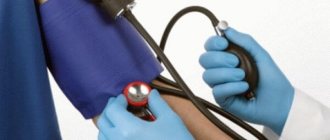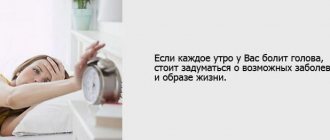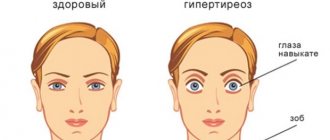Ear congestion is a symptom that indicates pressure on the eardrum from the inside or outside. This problem most often occurs when diving to depths, and is possible during air travel, jumping or running. Pressure on the outer or inner side of the membrane causes its excessive tension. While the elasticity of the membrane becomes worse, the quality of the captured sounds drops significantly. Low blood pressure is considered a common cause of congestion. But the same symptom can appear with hypertension, so it is important to understand at what pressure the ears become clogged, what causes the problem and how to act.
Blood pressure surges and their causes
It is the value of blood pressure that is one of the main criteria by which one can judge the health of the heart and blood vessels. If within 24 hours the tonometer readings change within 10 mm, this is considered absolutely normal. However, more significant changes in blood pressure are a reason to think about a comprehensive examination, because serious heart problems or diseases of the genitourinary system can provoke pressure fluctuations.
In particular, pressure surges may indicate:
- hormonal imbalances (for example, during menopause and on the eve of menstruation in women);
- diseases of the genitourinary system (prostatitis in men, the presence of inflammatory processes and kidney problems in women);
- heart failure;
- some diseases of the gastrointestinal tract (stomach ulcer, pancreatitis, cholecystitis, acute stage of gastritis);
- nervous fatigue;
- circulatory disorders as a result of diseases of the musculoskeletal system.
In some cases, the “culprit” for fluctuations in blood pressure is osteochondrosis, lack of a balanced diet, abuse of drinks with a high caffeine content, as well as alcohol, smoking, taking contraceptives and frequent visits to the solarium.
Why does internal pressure occur in the ears: the main reasons
If the feeling of pressure in the ears and other listed symptoms recur or do not go away for too long, a visit to a specialist cannot be postponed. The longer the problem remains unresolved, the more likely it is that no less serious complications will arise for the body.
If you feel:
- regular intense headache;
- dizziness with loss of balance, coordination of movements;
- partial or complete loss of hearing ability;
- pain, feeling of squeezing in the heart, lack of air.
There are two main reasons as a result of which a person may experience pressure in the ears: inflammatory processes occurring in the ear itself and damage to the vascular system
Go to the hospital as soon as possible, as all of these may indicate the presence of:
- chronic hypertension;
- cervical osteochondrosis;
- increased intracranial pressure;
- cerebral atherosclerosis;
- otosclerosis (damage to the bone capsule of the labyrinth of the inner ear);
- tumors of the auditory nerve;
- old wax plugs in the ears.
Taking certain medications from the group of antibiotics may also likely cause otosclerosis, since some of them have a pronounced ototoxic effect. Frequently talking on a mobile phone, listening to music on headphones at high volume, frequent air travel are factors that can also provoke hearing problems.
However, most often hearing impairment can be associated with one of the following reasons:
- inflammation in the ear;
- vascular damage.
Symptoms of pressure surges
If a person has a tendency to severe hypertension or hypotension, then deviations in blood pressure may not have pronounced external signs.
However, with a tendency to pressure changes, accompanying symptoms almost always occur:
- dizziness and general weakness;
- increased heart rate;
- pressing sensation in the sternum;
- feeling of numbness in the limbs;
- increased sweating;
- lack of coordination;
- Strong headache.
Often accompanying blood pressure surges are nosebleeds and a feeling of stuffiness in the ears.
Neuroma
If a person feels that something is pressing on his ears from the inside, a buzzing in the ears, then it could be a neuroma. This is a benign tumor. A neuroma can be described as a neoplasm that occurs in the cellular structures that line the nerve canals.
Neuroma has the shape of a capsule or ball. A tumor forms in the radicular part of the auditory nerve. Most often, its influence extends to the hearing aid and facial nerves. In addition to pressure in the ears, a sign of the presence of neuroma is loss of sensitivity in the limbs.
Otitis differs in that it can act both as an independent disease and as a result of another disease suffered earlier. Its treatment needs to be given special attention, as the disease can lead to even more serious complications.
Causes of stuffy ears due to high blood pressure
The effect of blocked ears can also occur in absolutely healthy people, for example, during air travel or a sharp descent from the mountains.
Sometimes the cause of the problem is also ENT diseases . Regardless of whether external factors or blood pressure fluctuations , from a physiological point of view the causes of congestion will be the same.
For a certain period of time, the eardrum loses its natural mobility and is pressed into the Eustachian tube, which causes a lack of proper response to the influence of sound waves. As a result, hearing deteriorates, and a person hears speech mainly in high tones.
Video: “At what pressure does it hurt your ears?”
At what pressure levels does the ear clog?
Congestion in the ears can occur both with a significant decrease and with an increase in blood pressure - a conclusion about the real reason for the change in well-being can be made based on the tonometer readings.
Most often, hypertensive patients experience hearing loss when pressure increases to 150-160 mm. rt. Art . In this case, a nagging headache, blurred vision, and redness of the face may also be observed.
With hypotension, hearing impairment is usually the result of congestion in the blood vessels , which provokes increased heart rate.
As a result, systolic pressure may increase while diastolic pressure remains the same. If the difference between the two indicators reaches 40 mm Hg. Art., this is fraught with serious damage to blood vessels and the heart.
What to do if you feel pressure in your ears
The main thing that should not be done in this situation is to try to cope with it on your own or wait for everything to go away on its own. First of all, make an appointment with an otolaryngologist - he will check your ears for the presence of wax plugs, and also determine the degree of hearing loss, rule out or confirm the presence of ear infections, mechanical damage to the eardrums. If the cause is found immediately, the doctor will prescribe a treatment suitable for your particular case; if not, he will refer you to another specialist. You may need to consult a neurologist or cardiologist. You need to be prepared for the fact that you will have to undergo a lot of different examinations and pass a number of tests. Do not also forget that all recommendations of specialists are mandatory. Untreated diseases soon make themselves felt again, but at the same time they already enter the chronic stage, and then it is much more difficult to fight them.
Associated symptoms
With low blood pressure, tinnitus is usually accompanied by loss of strength, fainting, and dizziness when changing body position. Very often, the deterioration of well-being in hypotensive patients becomes a reaction to a change in the meteorological situation.
With hypertension, a feeling of fullness in the ears may be the only symptom of the disease . However, with a rapid increase in blood pressure, pain in the back of the head and impaired coordination of movements may also appear. If you experience numbness in the limbs and pain in the chest area, there is every reason to suspect problems with the heart muscle.
Treatment
Once you have determined the cause, it is important to understand how to deal with the feeling of pressure in your ears. Since the origin of this phenomenon is quite diverse, the treatment should be appropriate. Most often they resort to conservative correction with medications. Considering the cause of hearing impairment, the following groups of drugs may be prescribed:
- Antibiotics, antiseptics, antivirals - for otitis, rhinosinusitis, pharyngitis.
- Serotonin uptake inhibitors, ergotamine derivatives – for migraine.
- Antihypertensive – for increased blood pressure.
- Diuretics and venotonics – for intracranial hypertension.
- Antiplatelet agents, lipid-lowering - for atherosclerosis.
Physiotherapy is also used in complex treatment, for example, UHF therapy, electrophoresis, massage of the cervical-collar area. In some cases, surgical correction is required, in particular with chronic otitis media and otosclerosis. If the cause of swelling in the ears is a change in atmospheric pressure, then simply open your mouth or yawn. After water procedures, it is recommended to immediately clean the external auditory canal of water and soaked wax.
A feeling of pressure in the ears is a fairly common symptom that can be experienced by many people of different ages. But there are quite a few reasons for this phenomenon, which requires careful medical diagnosis. And only after identifying the source of the problem can we talk about correction methods.
Source: elaxsir.ru
Treatment of ear congestion and high blood pressure
If the cause of hearing loss is precisely problems with blood pressure, the only way to get rid of the unpleasant symptom is to treat the underlying disease - hypo- or hypertension.
First of all, it is necessary to measure the blood pressure level , and, depending on the readings on the tonometer, take specific measures.
- If your blood pressure increases, it is important to lie down, apply a vinegar compress to your feet, and, if necessary, take medications prescribed by your doctor.
- With low blood pressure, it makes sense to take a short walk in the fresh air, drink strong coffee or another drink with a tonic effect, and eat 20-30 grams. dark chocolate. If your health deteriorates significantly and pre-fainting conditions appear, it makes sense to seek qualified medical help.
In some cases, pressure surges are a consequence of diseases of the internal organs or circulatory disorders. If blood pressure fluctuations have become systematic, it is advisable to conduct a comprehensive examination, including all or some of the following manipulations :
- general blood analysis;
- conducting MRI of the brain;
- Doppler examination of blood vessels;
- EEG;
- X-ray examination of individual areas of the spine.
Based on the test results, drug treatment, manual therapy or therapeutic exercises can be prescribed.
Video: “What to do if you have ear congestion?”
Drugs
Medicines can only be taken as prescribed by a doctor. To accurately determine the causes of pressure surges, it is advisable to consult not only a therapist, but also an endocrinologist, cardiac surgeon, and gastroenterologist.
Depending on whether the patient has high or low blood pressure, an appropriate complex treatment regimen is selected.
- If there is a sharp deterioration in health at home, hypotensive patients may use homeopathic products with a tonic effect (in particular, tincture of Eleutherococcus). If the decrease in blood pressure occurs regularly, the doctor will prescribe the use of hypertensive drugs (Cordiamine, Mezaton, caffeine-containing drugs).
- For hypertension, the nature of treatment is determined by specific indicators on the tonometer and the reasons that cause a jump in blood pressure. As an emergency aid, you can slowly dissolve a Nifedipine tablet or take Corinfar. As part of complex treatment, after a full examination, the patient is usually prescribed ACE inhibitors, beta blockers and calcium antagonists.
Surgery
The need for surgical intervention occurs extremely rarely and only in cases where pressure fluctuations are caused by serious pathological phenomena in the body (diseases of the pancreas, liver, ulcerative processes, etc.).
Treatment at home or with folk remedies
The first rule when there is a pressure surge is that the person must take a horizontal position.
Next, you need to measure your blood pressure using a tonometer, and, based on the results obtained, take the following measures .
- For hypertension, it is recommended to wash your face with cool water, take a contrast shower, make a warm bath for your hands or a vinegar compress on the area of your feet.
- If you have low blood pressure, sweet tea or coffee, chocolate, or a few glucose tablets help you feel better. An excellent effect is achieved by using herbal infusions based on lemon balm or mint.
Diet
Very often, pressure surges are provoked by an unhealthy lifestyle, alcohol abuse or lack of a balanced diet.
To avoid deterioration of health, it is recommended:
- limit daily salt intake;
- minimize consumption of fatty animal products;
- exclude the consumption of alcoholic beverages;
- choose a nutrition plan that allows you to avoid excess weight.
Methods for eliminating congestion and diagnosing the body
What to do if your ears are blocked due to high or low blood pressure?
In this case, self-medication is dangerous, since any actions can provoke a worsening of the situation. Only a doctor (therapist or otolaryngologist) will determine the cause of the disorder and provide competent treatment. If there are no otolaryngological diseases, you will need to check the condition of the blood vessels with a cardiologist. Diagnostics is carried out using:
- Duplex scanning of head and neck vessels (USDG).
- Tympanometry.
- Visual examination of the ear cavity.
- MRI or CT.
- Audiometry.
- Video endoscopy of the ear, nasal cavity and nasopharynx.
- Pressure measurements.
- Electrocardiograms.
- Blood and urine tests.
If pressure surges are caused by a heart defect and a deviated nasal septum, the patient is recommended to have surgery.
If there are significant indications, the otolaryngologist will prescribe lavage of the ear canal and nasal cavity, blowing and catheterization of the auditory tubes, and pneumomassage of the eardrum. Removing a foreign object should also be entrusted to the hands of an experienced specialist.










